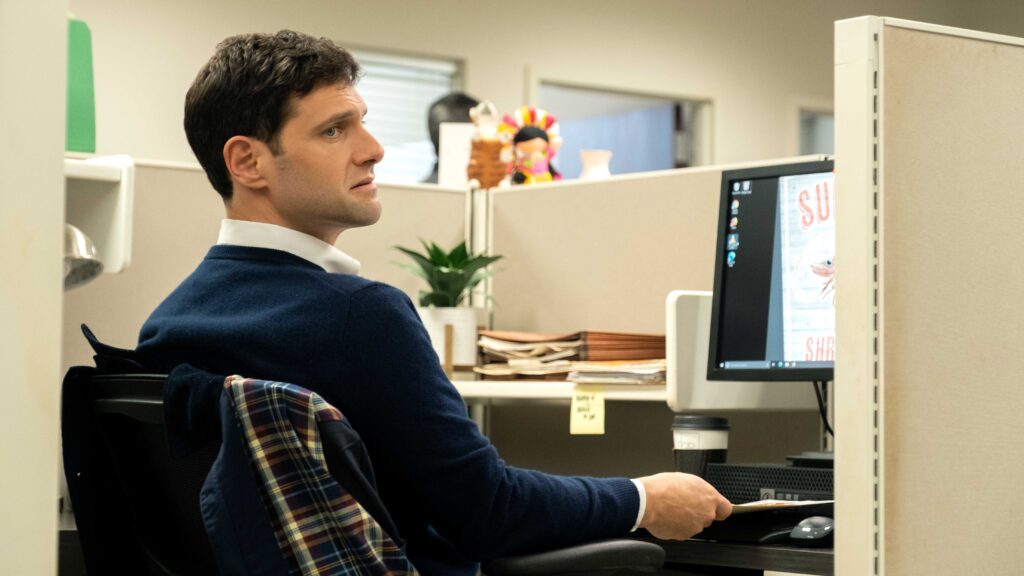Want to hear more from the actors and creators of your favorite shows and films? Subscribe to The Cinema Spot on YouTube for all of our upcoming interviews!
Managing editor & film and television critic with a Bachelor's of Arts in English Literature with a Writing Minor from the University of Guam. Currently in graduate school completing a Master's in English Literature.
Following last week’s episode of Atlanta, we return to the titular city of Georgia. The fourth episode of the third season is titled, “The Big Payback”. It is written by series supervising producer Francesca Sloane, with Hiro Murai on the director’s chair.
In this review, I will be discussing Atlanta Season 3 Episode 4. There will be no spoilers here, as the title of this article suggests. Nonetheless, please read ahead at your own discretion to avoid any possible revelations.

Plot Synopsis
According to FX Networks, here is the logline for Atlanta Season 3 Episode 4.
I was legit scared watching this.
FX Networks
Discussion
If you thought the Atlanta Season 3 premiere episode was bonkers, then this week’s episode will rattle our heads a little more. We have much to think about in terms of race and more specifically, the discourse on slavery and reparations. Donald Glover and his team are never afraid to tackle the touchier issues and topics of the United States; so I did not expect this episode to stray away from that. In fact, last week Glover himself teased via a Tweet that the reactions to this episode would have some critics “mad”. I can confirm: it is true.
First, allow me to cover the plot structure and cinematic elements.
Cinematic As Always
The teleplay that we have this week provides us with a basic three-act structure, where the characters are introduced, then we encounter their conflict(s), concluding with some sort of resolution. Easy to understand, right?
Next, we have Sprenger’s cinematography, which is always excellent to see. The way the scenes are framed makes the overall narrative appealing to the eyes, making even falling in line at a cafe appear lovely. There is a shot that calls back to a camera angle shown in last season’s “Woods” episode. It gives a sense of loneliness that certain people may have and lends it to this episode’s given social group.
Malone, Udeorji, and Pilzer’s musical supervision do not miss when adding to the emotion of the episode. They give us Roberta Flack’s “The First Time Ever I Saw Your Face” and Minnie Ripperton’s “Les Fleur”, two songs that suggest that we will be okay and each day will bring us something new. These songs surfaced in 1957 and 1970 during the historical period when the fight for civil rights was at its peak. This sweet musical facet of this week’s Atlanta balances with the ambivalent storytelling.
Now, let us dig deeper into the themes and concepts of the episode.
Eat It and Weep
Not only is the music sweet, but the storytellers of the episode exhibit pastries — namely, madeleines and chocolate chip cookies — that are symbolic themselves. We have Marshall Johnson (Bartha) purchasing himself madeleines at a cafe; they are neatly packaged and arranged inside of a transparent little plastic and delicately labeled so that you can see how much thought was put into the product. Meanwhile, we later find a cookie that seems to have been dropped into a little paper bag with the word “Cookie” plastered on it.
Given madeleines’ French roots and how they can each be made and presented as a sponge cake or a cookie, it could be suggested that these two types of treats represent the classes of America. On one hand, there is the upper class (i.e. “bourgeois”) food that appears as “fancy”. Meanwhile, there is the cookie, which is fairly common amongst classes and a treat that most people can find in stores. The cookie could indicate lower- and middle-class undertones, and if we can remember what foods were eaten in Jordan Peele’s Us, then we can understand what the approach may be in this episode.
Let’s not forget the logo for Johnson’s workplace, Superior Shrimp. “Superior” is a word at the top of the logo, with the word “Shrimp” at the bottom. This brings a whole new meaning to the term, “food chain”.
The Writing’s on the Wall… and Your Shirt
Also at Johnson’s workplace is a poster for eye infections and acanthamoeba, a rare microorganism that, at worst, threatens vision in human beings. Anyone can get an eye infection, but seldom are people blinded by it. The entire episode is a debate on whether Johnson himself is racist, with him sharing a crucial conversation with his daughter, Katie (Blum). If we consider statements such as “I don’t see color”, then it makes more sense why this poster was included in the background.
Johnson is constantly ignorant of his past, and if not his past, then his ancestors’ past and how they helped affect persons of African descent over the past few centuries. The signs are everywhere, even in the restroom where he urinates and defecates as well as washes his sullied hands. Remember the Black Lives Matter (BLM) social media posts in 2020? Words are rhetorical, and in this episode of Atlanta, it is all about the font and background that are used. The narrative is literally begging you to read in-between the lines…
Abnormality: The Exclusion of Lepers vs the Inclusion of Plague
This entire episode concentrates on reparations, not to be confused with the concept of cancel culture. The racial roles are reversed, and we see that one group has benefited from a major event, while the other does not. Additionally, we have Johnson and some Superior Shrimp colleagues worried about what will happen to their family backgrounds. We are at an age of the Internet where access to personal data could be available to anyone. This plays well with Michel Foucault’s theory of abnormal human beings.
Some individuals are cast out of their little “machine” society after members discover how sick such individuals have become. According to Foucault, lepers cannot be excluded from society without first including individuals and treating them as if they were a plague. In his lectures, he explains that we all, as members of society, have our names logged into the system; every personal detail that we possess is recorded into files and passed around as we are constantly being examined. This is an interesting idea to think about.
A similar circumstance has been worked out in HBO’s Watchmen, albeit dramatized to a higher degree. Atlanta continues to answer the tough questions about sociopolitical issues such as “What if minority groups actually received feasible benefits from the system of control?” to which, I reiterate, we learn: we will all be okay. It is not necessarily that people are cast out, but instead, they have migrated elsewhere.
The Other
With the concept of inclusion and exclusion, I must extrapolate into the concept of the Same and the Other. What is seen as the Same in this episode are the routines between social groups. According to Byung-Chul Han’s The expulsion of the other, “[A]nxiety ensues where the ‘at-home of publicness … collapses and gives way to a ‘not-at-home’.” Anxiety is tied to death, or rather, a change in routine or lifestyle, which leads to the Other. He adds, “If one denies death for the sake of life, life itself turns into something destructive. It becomes self-destructive.” Johnson constantly denies his ancestors’ choices, that what they did does not affect himself; ultimately, the choice that he makes is better than if he were to stay on the path he was treading.
Han suggests that anxiety puts individuals on a metaphorical and liminal route to transformation and what is unknown. Again, the episode answers what happens if we were to actually have this “big payback”.
At the end of the episode, we find members of a social group being cast out into an area that is akin to a prison. Sloane and the writers’ room use language to indicate that this is, indeed, the case. Johnson and another character exchange heavy dialogue, beginning with “How long are you here for?” followed by “we’re on the same boat”. Here, I should argue that certain characters are not oppressed but just perceived and treated as “Other”. When you feel it in your entire essence, your being that you do not have what it takes to endure something new and painful, you self-destruct and are thrown overboard.

The Crew of Atlanta
Donald Glover, Paul Simms, Dianne McGunigle, Stephen Glover, Hiro Murai, and Stefani Robinson serve as the executive producers of the series. Janine Nabers serves as the co-executive producer, while Kathryn Dean and Kaitlin Waldron serve as the producers. Ibra Ake, Taofik Kolade, Jamal Olori, and Francesca Sloane serve as the supervising producers. Jordan Temple serves as the co-producer.
Alexa L. Fogel stars as the casting director, while Tara Feldstein Bennett and Chase Paris serve as the Atlanta casting directors of the episode. Kathryn Zamora-Benson serves as the casting associate for the episode.
Christian Sprenger returns as the director of photography, while Kyle Reiter and Isaac Hagy serve as the editors of the episode. Jen Bryson and Cameron Ross return as the assistant editors.
Jen Malone and Fam Udeorji return as the music supervisors, with Whitney A. Pilzer as the associate music supervisor. Jamie Levinson scores the composition of the episode.
Timothy O’Brien serves as the production designer of the episode. Denise Tunnell serves as the head of the make-up department, while Shornell Young is the head of the hair department. Tiffany Hasbourne serves as the costume designer. Liz Ayala is the set decorator.
The Cast of Atlanta
Donald Glover, Brian Tyree Henry, LaKeith Stanfield, and Zazie Beetz are credited as their respective main characters: Earnest “Earn” Marks, Alfred “Paper Boi” Miles, Darius Epps, and Vanessa “Van” Keefer.
Justin Bartha stars as the episode’s protagonist, Marshall Johnson. Scarlett Blum plays his daughter, Katie. Tobias Segal reprises his “Three Slaps” guest role, now as a man named “E”.
Dahlia Legault stars as Natalie, Marshall’s wife. Melissa Youngblood portrays Sheniqua Johnson.
Jerome Beazer and Ashlyn Stallings play a Black customer and a white barista, respectively. Randall Taylor plays Marshall’s boss, while Megan Hayes plays a pink-faced woman. Eric Jepson and Madison Hatfield play Greg and Paula, white co-workers of Marshall’s. Mary Emily Deal appears as a sobbing woman in the Superior Shrimp parking lot. Gus Allen plays a white man in a suit.
D. James Jones and Exie Booker portray Willy and Lester, two Black co-workers of Marshall’s, respectively. Candi VandiZandi plays a blonde. Tyler Rainey plays a character named Black Jason, while Joan Reilly appears as a hotel employee.
Jon Levine plays a Jewish lawyer, while Regie Cashaw plays a Black lawyer. Jerren Mebane appears as a Black kid. Kyle Porter plays an orientation leader, while Kevin Pocasangre portrays Cruz.
Justin Bartha’s Johnson: Performance and Character Development
As the main character of this week’s episode of Atlanta, Bartha steals the show with his appearance. Having grown up watching the National Treasure and Hangover films, I found that the actor is capable of demonstrating the gravity and weirdness of the human condition. I would love to see him in future episodes of the show, but I do feel that Atlanta is using Bartha to anthologize narratives that are outside of Earn’s, Paper Boi’s, Darius’s, and Van’s personal and collective worlds.
We do not get much of Johnson other than his marital/ familial status along with his roots. Interestingly enough, we had the symbol of the tree in last week’s episode, “The Old Man and the Tree”, so coming back to this idea and that of the Other is not new. If we do not see him again, then I do have hope that he will be alright.
Final Thoughts on This Week’s Atlanta
There is much to say about “The Big Payback”, but I wanted to keep it as close to 2,000 words as possible. At the end of my notes for the episode, there is a quote spoken amidst the dialogue by one character to Johnson pertaining to painful experiences. They say, “It is a cruel, unavoidable ghost that haunts in a way we can’t see. None of us are perfect”. It is extremely interesting that the writers return to the sense of sight, considering what we see (or don’t see) in the background.
Our subjective encounters with the phantasm depend on whether we are consciously aware of matters around us or not; that is the most important thing about Atlanta. We are all affected by life’s happenstances, and there is no denying it.

Donald Glover’s Atlanta Season 3 is now on FX and streaming via Hulu!
Have you seen Glover’s series? If so, then what are your thoughts on it so far? Let us know! For more comedy and drama-related news and reviews visit and follow The Cinema Spot on Facebook, Twitter, and Instagram!
Managing editor & film and television critic with a Bachelor's of Arts in English Literature with a Writing Minor from the University of Guam. Currently in graduate school completing a Master's in English Literature.





19 Comments on “‘Atlanta’ Season 3 Episode 4 Non-Spoiler Review – “The Big Payback””